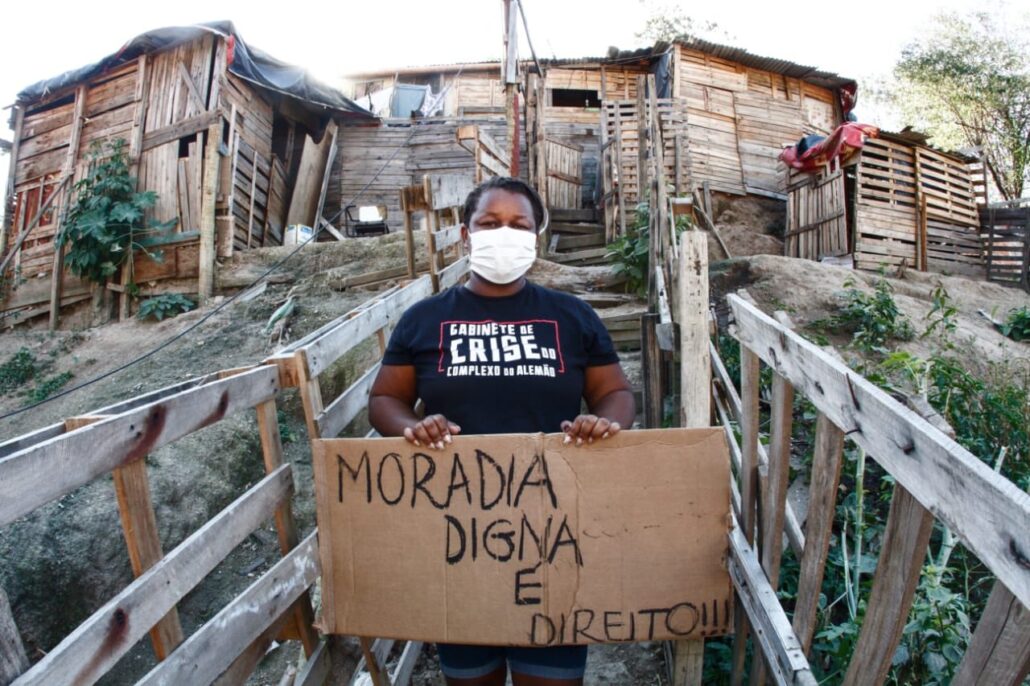
This is the first of a two-part article about the twelve-year struggle for housing by Favela da Skol residents, revealing Rio de Janeiro’s political backstage during an election year.
The game of chess simulates a conflict between two armies, each comprised of 16 pieces and played according to intense logical and strategic reasoning.
All pieces (the king, queen, rook, bishops, and pawns) except the knight move in a straight line—horizontally, vertically, or diagonally. The player who manages a checkmate, which is a decisive attack on the king—the most important piece of the chess game—wins, leaving the king with no possibility of escape or defense.
On a cloudy Saturday morning during Rio’s winter, on June 11, residents, local leaders, and politicians met in front of a school on Avenida Itaóca, in the favelas of Complexo do Alemão, in the city’s North Zone. The ceremony marked the launch of a public works project to build 495 housing units. In the same place where public housing apartment blocks will be built once stood Favela da Skol, from which residents were forcibly evicted by the state in 2010 after an abandoned building occupied by families caught fire. Present at the ceremony was Rio’s Governor Cláudio Castro, who has since been reelected.
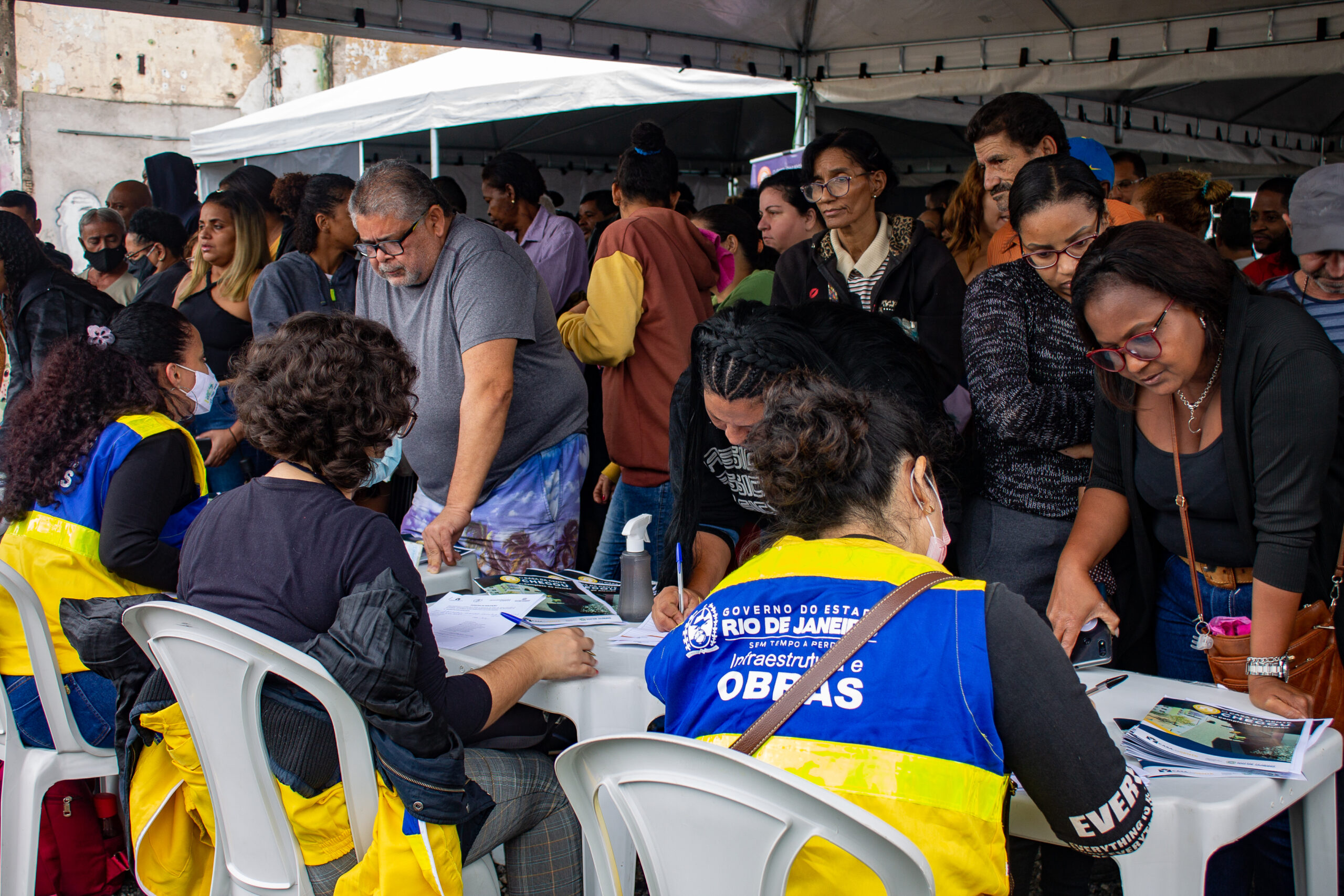
During this period, government executives are prohibited from signing agreements, granting public housing, inspecting public works, or attending traditional festivals. The objective of these restrictions is to prevent public officials from using the inauguration of public works to the detriment of other candidates: the public apparatus cannot be used in an electoral race.
In the day-to-day moves of Brazil’s political chess, it is common that on the eve of the deadline instating these restrictions, there is a “race against time” to approve and inaugurate public works. Cláudio Castro was no exception. He intensified his schedule of public works inaugurations and other projects to maintain political capital. As Extra reported, the governor participated in the inauguration of soccer fields and made it a point to be present at the delivery of hospital beds and the unveiling of housing units, with appointments spread across the state. Overall, he participated in 18 of these events in just one week between June and July.
Cláudio Castro’s candidacy for reelection in Rio’s gubernatorial race was confirmed by the Liberal Party (PL) convention during a meeting held on July 20, with Washington Reis (MDB) as vice-governor. Convicted of an environmental crime, Reis, the former mayor of the city of Duque de Caxias, was eventually considered ineligible to run and substituted by Thiago Pampolha (União Brasil Party).
The launch event to kick off construction of the Skol public housing condominium therefore took place within the threshold outlined by electoral law and aligned with Brazil’s Superior Electoral Court’s (TSE) Resolution No. 23.674/2021, which established the 2022 electoral calendar. The deadline marking the start of three months prior to election day was July 2.
During Governor Cláudio Castro’s prior visit to Complexo do Alemão on March 18, things had been tense. Castro arrived at Morro da Baiana to mark the beginning of the cable car recovery project. There, he was interrupted by one of the leaders of the housing rights movement in Complexo do Alemão.
“You said that the cable car and the housing [project] would happen simultaneously. We can’t take any more of these promises… I can’t be happy! I have no home! And there are a lot of families here on a housing allowance watching millions be spent on the cable car again… it’s unacceptable. Housing is a human right!” quoted Voz das Comunidades at the time.
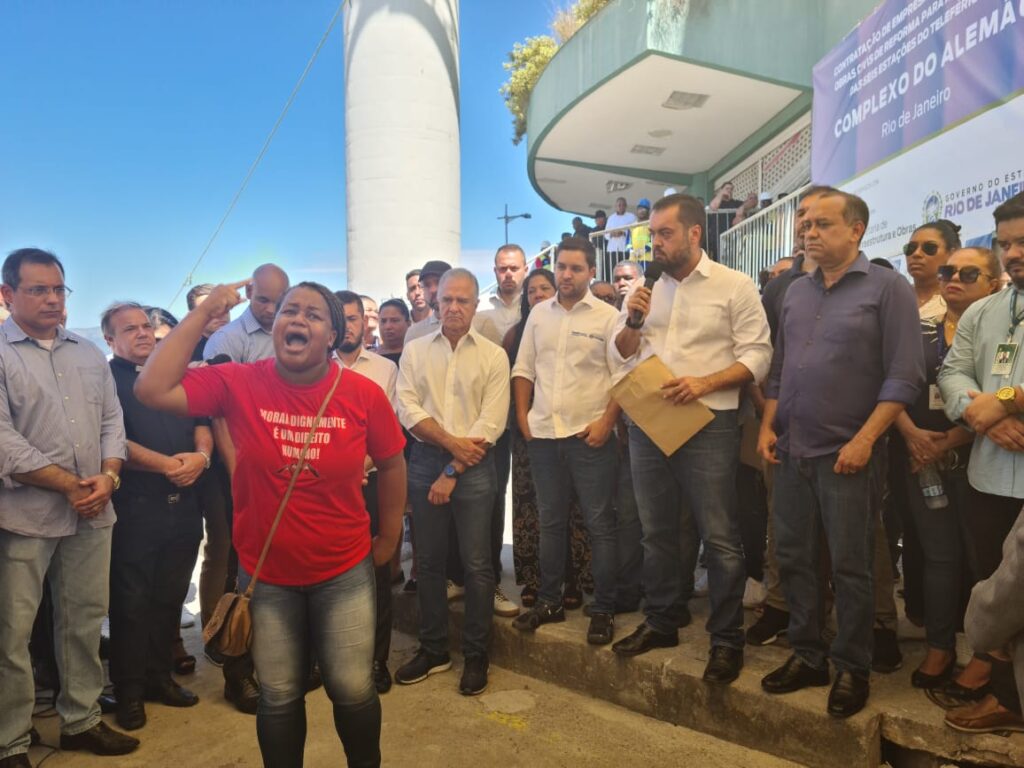
The quote is attributed to Camila dos Santos, more commonly known as Camila Moradia (“Housing Camila”), an internationally respected defender of human rights. Moments before her speech, Cláudio Castro had said, “sometimes, we don’t like to come to certain places because people are so jaded that they just stare at us with frowning faces.”
The activist then jumped over camera phones and photographers to hold the governor accountable for the promises he made in June 2021, when he invited leaders from Complexo do Alemão to speak for him to hear their various community demands. During this event, he promised participants in Complexo do Alemão’s Housing Commission that the disbursement for the cable car recovery project would happen at the same time as the disbursement for the construction of housing units.
According to Camila Moradia, Castro said: “they will be disbursed together, regardless of whether or not CEDAE (Rio de Janeiro’s state water and sanitation utility) is privatized.” She questioned the governor accordingly, handing him a petition demanding improvements to social rent and housing in the region:
“I haven’t had a home in 12 years. It’s obvious I have to frown. The cable car cost over R$200 million (US$40 million) and was scrapped. So now he comes to Complexo do Alemão to announce R$170 million (US$32.7 million) for the same project? I’m just supposed to stand there and clap for the cable car? Though I do recognize the importance of the work—because with the [cable car’s] closure there was an increase in school dropout rates—we have over 1,300 families without homes. I, for example, was forcibly evicted from Favela Skol twelve years ago.”
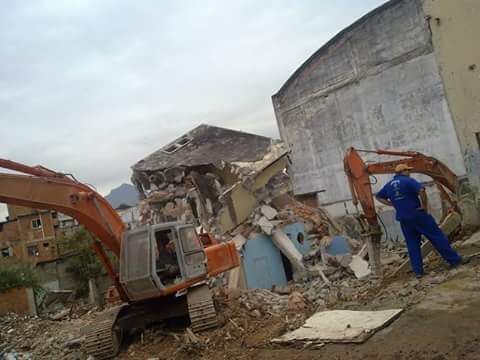
Housing is a fundamental human right, guaranteed by the Brazilian Constitution since 1988. It falls within the scope of the Union, states, and municipalities’ responsibilities. As the constitution points out, it is up to the states to “promote housing construction programs and improve housing conditions and basic sanitation.” There are even provisions for using unproductive land, abandoned land or public or private buildings that accumulate government debt for the purpose of public housing.
The story of “Favelinha Skol,” as it was known in Complexo do Alemão, begins with a basic need for survival and a lack of public housing policy. After pressure from residents, the government published a public bid on the same day announcing the construction of 320 housing units. These are to be built by the Department of Infrastructure and Public Works, right on the land of the former Skol beer factory, at Avenida Itaoca, 2,277, Inhaúma.
According to Camila Moradia, the content of the public notice states that this will be the first phase of public works in the community, but that 1,300 properties will be delivered to serve all registered families who currently live on social rent. In this first phase, the project foresees two building complexes, each with 45m² apartments and two bedrooms per unit.
A Right or a Game Piece?
The beginning of public works on the future apartment blocks—whose buildings will be named after historical community leaders—would fulfill the dream of owning a home for the 600 families who have been fighting over 12 years for access to housing in Complexo do Alemão.
The story of Favela da Skol begins in the 2000s when Complexo do Alemão residents, who were already struggling to earn a living at, decided to occupy the old, abandoned area where the Skol beer factory, which closed in 1994, used to be.
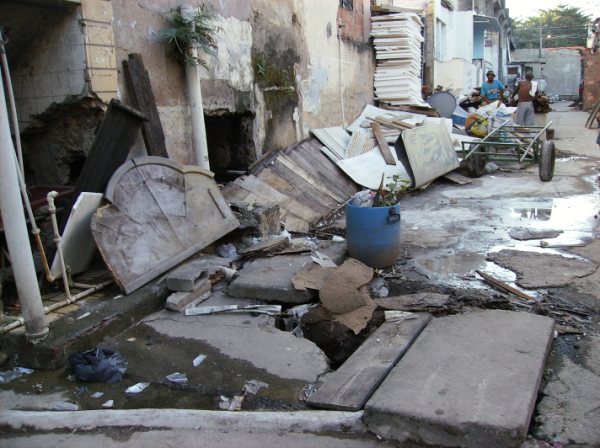
“In Skol, people really lived below the poverty line. Poverty was extreme. There were three buildings and one of them caught fire. That’s when the vice governor at the time, Pezão, went to visit and said he would evict everyone from there,” recalled Camila Moradia. She arrived at the occupation in late 2003, when she was having a hard time paying rent.
At the time of the residents’ occupation of the area, the state of Rio de Janeiro was governed by Rosinha Garotinho (2003-2007). After her administration, it was governed by Sérgio Cabral (2007-2014). This government carried out a large volume of public works in Complexo do Alemão, which was driven by security forces’ occupation of Alemão in 2010 and subsequent implementation of the Pacifying Police Units (UPPs).
Investment in Complexo do Alemão by the federal government’s Growth Acceleration Program (PAC) began in 2008 with the construction of the cable car, which at the time was listed as one of the legacies that would be left for the city’s use after the 2014 World Cup and 2016 Olympics. According to Camila Moradia, precisely because of the PAC works was why there was no resistance from families against the eviction:
“We didn’t offer any resistance because we actually lived there below the poverty line… and the PAC construction works were happening. Everyone was watching the apartment blocks go up, all of them being built and delivered. This was the dignity we dreamed of! That’s why we didn’t put up any resistance. One part left in 2010, another in 2011. I left [the occupation] on September 22, 2011 and followed the entire demolition process. They said that within a year and a half everything would be built. We believed them! And we believed them because we saw that other buildings went up in nine months. So, we thought the same would happen for us. We left without showing any sign of resistance.”
At the time, the resettlement process promised was that when the families left, they would begin receiving social rent, which would dry up once their units were built. “Since 2011, I have received the [monthly] amount of R$400 (US$76.92) in social rent… There is a decree that states that it is impossible to change the amount, but this same decree also states that one cannot remain on social rent for more than five years. I’ve been on it for eleven years. It’s a flawed decree,” said Camila Moradia.
In all, 1,300 families in Complexo do Alemão receive social rent from the State. According to the Department of Welfare and Human Rights’ (SASDH) Social Rent Portal, a total of 519 families registered as residents of the “Skol community” were receiving R$400 in social rent until June 2022, totaling R$207,600 (US$39,920). The total number of families receiving social rent in Complexo do Alemão is even higher.
The data reveal how much the right to dignified housing and the construction of public housing lags behind in Complexo do Alemão and in other favelas across the state, and how much progress is left to be made. For example, in Jacarezinho alone, there are 1,412 families on social rent, in addition to the 386 families evicted from the Cooperativa Central dos Produtores de Leite (CCPL) community. This favela was also formed by a similar occupation of unhoused people in the abandoned sheds of a now-closed milk factory in Benfica. The factory closed in the early 2000s.
Both regions received public works via the State of Rio de Janeiro Strategic Plan, in partnership with the federal government through PAC.
The SASDH Social Rent Portal shows that there are people registered to receive the benefit in favelas of Rio de Janeiro, and in the metropolitan area’s Baixada Fluminense region, as well as in the municipalities of the state’s mountainous region: Nova Friburgo, Petrópolis, and Teresópolis.
Housing policies concerning favelas and peripheral populations were on the political agendas of candidates who ran this year for federal and state deputy, the Senate, and the presidency, but particularly in the gubernatorial race.
This report on how public housing in Rio de Janeiro became a chess piece in the state’s electoral game, based on the analysis and reports of families from Favela da Skol in Complexo do Alemão, does not end here. In part two of this special report, we will reveal the backstory and saga facing the families of Complexo do Alemão in their struggle to access the right to housing after being forcibly removed by the State.
